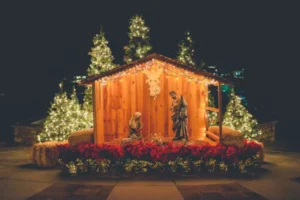The crowds were swelling by the sea. So many people flocked around Him that Jesus had to get into a boat so He could teach them without being trampled. Facing the shore, He began teaching using his favorite method — parables.
Jesus told the crowd a story about a farmhand who cast seeds around a pasture. Some of the seeds couldn’t penetrate the soil and they were either snatched up by birds or choked by thorns. Other seeds landed on good soil, flourished, and produced much fruit. Still others fell in an in-between category; they landed on rocky soil and quickly grew up, but lacking real roots, their life was cut short.
After the crowd dispersed, Jesus revealed the meaning of His parable to the disciples. He explained,
“And the one sown on rocky ground — this is one who hears the word and immediately receives it with joy. But he has no root and is short-lived. When distress or persecution comes because of the word, immediately he falls away.” (Matt. 13:20-21, CSB)
This “seed” that quickly sprouts with enthusiasm only to soon fall away reflects a scenario that many of us are all too familiar with. We’ve either seen it in others or experienced it in ourselves. So what does it take to become a person who, like the good seed, has a faith marked by both great joy and deep, sustaining roots?
Testing experiences
You have probably had a powerful spiritual experience at least once in your walk with Christ. Many of us became Christians through such experiences at youth camps, conferences or church events. Perhaps you’ve even felt an extraordinary awareness of God’s presence and love during your private devotional time.
These occasions are thrilling and fill our souls with life, even though we know they are frequently followed by stale and dry seasons. Still, a season of dryness after such an event doesn’t necessarily invalidate that experience if it was authentic. As such, it’s wise to test a powerful experience to discern that it was a real encounter with God. Was that powerful experience true spiritual renewal or was it mere emotionalism?
In his classic book “Dynamics of Spiritual Life,” Richard Lovelace defines true spiritual renewal as the ongoing work of the Holy Spirit to restore us to God-centered living through a deeper apprehension of the gospel. He explains that the soil for renewal requires two foundational realizations: the holiness of God and our sinfulness. These preconditions awake us out of spiritual complacency and create fertile ground for the gospel. Since we are aware of both God’s righteous judgment and our need for salvation, we are ready for gospel truths to take root.
Lovelace then gives four interconnected truths from the gospel that act as an engine for renewal. You can use these truths to test a powerful spiritual experience:
- Do you have a greater assurance of acceptance by God based solely upon the work of Christ?
- Do you desire greater transformation into Christlikeness?
- Do you have a deeper awareness of the Holy Spirit’s empowering indwelling that makes Christ real?
- Do you have a stronger confidence in Christ’s supremacy over all spiritual conflict?
Where’s the fruit?
While these questions provide us with an inward test, we can also observe their outward effects to discern spiritual renewal. If the gospel has taken deeper root in our hearts, then we will grow in theological understanding. Rather than being dependent on mystical experience, doctrinal truths ground us and bring us into greater spiritual maturity. Moreover, they train us to be more committed and consistent in prayer, authentic Christian fellowship, and evangelism.
It’s true that the dynamics of the spiritual life include both ordinary and extraordinary times, but times of extraordinary renewal are frequently followed by ordinary times of Christian faithfulness. We do not have to be deceived by emotionalism, nor must we resist the powerful moments of the Spirit’s work. If we know how to discern these events, we can walk through the pattern of ongoing renewal.
Three ways to dig deeper
So, what do you do after you’ve had an extraordinary experience of God? With a proper understanding of the dynamics of spiritual life — including ups and downs, ordinary and extraordinary times — we can make the most of these wonderful experiences. In the wake of an experience, we can dig deeper roots into the gospel so we continue to grow and our faith is strengthened. Here are three ways to maximize a positive spiritual experience or event:
1. Don’t get stuck.
It’s natural to want to stay in those moments or places where we had a powerful gospel encounter. They are glimpses of the glory we will one day experience without end.
In one fantastic scene from the Gospels, Jesus took Peter, James and John to the summit of a mountain. Jesus was transfigured before their eyes, revealing His divine glory that had until then been cloaked by His humanity. His face shone like the sun and His clothes were dazzling white. Next to Him appeared the Old Testament prophets Moses and Elijah.
The disciples were in awe. Peter said to Jesus, “Lord, it’s good for us to be here. If you want, I will set up three shelters here: one for you, one for Moses, and one for Elijah.” (Matt. 17:4, CSB) They wanted to stay in that moment.
Don’t we have the same tendency? We get a special experience of God’s glory in worship and desire to stay there. Don’t feel guilty for that; every Christian ought to desire an ongoing abiding in God’s presence. However, in this life, those extraordinary moments pass. They are a glimpse, and we cannot cling to them.
For example, don’t get stuck in the memories of a powerful moment at a camp or conference. Too many Christians try to stay there and their growth in the gospel is stunted. Be thankful for that unique place and experience, but you must then move forward with what God did through it and ask, “Where do I go from here?” Partner with God in continuing what He began in you there. Immature faith relies too much on extraordinary experiences; maturing faith is seizing them in gratitude and carrying them forward with you.
2. Cultivate a community.
One factor that usually accompanies extraordinary experiences of God or powerful seasons of growth is a community of believers. This factor isn’t coincidental; rather, it’s a normal part of the way the Christian life ought to be lived.
You experienced the magnificent love of God at camp along with many other people. You had a season of tremendous growth in the gospel, consistency in worship, and awareness of the Spirit as you were immersed in a Christian group. By reflection, you discover that your great experience of God happened in the context of a community of believers who were doing the same. This is why Paul encouraged Timothy to pursue God “along with those who call on the Lord from a pure heart” (2 Tim. 2:22). We weren’t made to live the Christian life in isolation.
Cultivate a community with other believers who are working to dig deeper roots into the gospel. You can’t take your camp or conference community home with you, so you’ll need to build that kind of community. Commit yourself to a church where you can pursue the application of that spiritual renewal along with others.
3. Carry spiritual keepsakes.
When we go on a great vacation, we love to come back home with a special souvenir that reminds us of that time. Or sometimes we carry meaningful tokens of remembrance for a person who has passed away. Similarly, it is a biblical practice to have spiritual keepsakes that bring our minds back to what God has done. The greatest example of this in the New Testament is Jesus’ institution of the Lord’s Supper. In 1 Corinthians 11, Paul wrote,
“For I received from the Lord what I also passed on to you: On the night when he was betrayed, the Lord Jesus took bread, and when he had given thanks, broke it, and said, “This is my body, which is for you. Do this in remembrance of me. In the same way also he took the cup, after supper, and said,” “This cup is the new covenant in my blood. Do this, as often as you drink it, in remembrance of me.” (1 Cor. 11:23-25, CSB)
The Lord’s Supper is an ongoing, tactile reminder of our salvation. We see several examples in the Old Testament too. In Genesis 28, Jacob had a magnificent vision of the Lord and His angels. Afterward, he set up a rock to be a marker for that place and named it Bethel, meaning “House of God” (Gen. 28:19). In 1 Samuel 7, after God gave Israel victory over the Philistines, the prophet Samuel set up a stone and named it Ebenezer, explaining, “The Lord has helped us to this point” (1 Sam. 7:12).
Sight, sound, smell and touch call our memory back to distant places. There’s a summer camp that has been a special place of renewal for me. In the middle of the land, there is a beautiful lake filled with cypress trees. For me, cypress trees have become one of those spiritual keepsakes that reminds me of the work that God has done in those times at that camp.
What is it for you? It can be an item, scenery, a song, a food or drink, or even a key Scripture that reminds you of God’s work. Remember that the keepsake isn’t as important as what it means. Don’t venerate any created thing; instead, identify it as a signal to recall the gospel to your heart and mind.
It’s all about Jesus
On the Mount of Transfiguration, after the cloud of glory passed, the disciples looked, and only Jesus remained. The important fact here is that they stayed with him — not the mountain, not the moment, not anything else. They left that place with Christ and returned to life, ministry and time spent with Him.
You must do the same. Seek Jesus in prayer, worship, and the Word. Allow the Spirit’s work to bring you more and more into a God-centered existence where you delight in His beauty — both in moments of powerful spiritual experience, and in the mundane seasons of faithfulness in between.
Copyright 2025 Aaron Shamp. All rights reserved.










